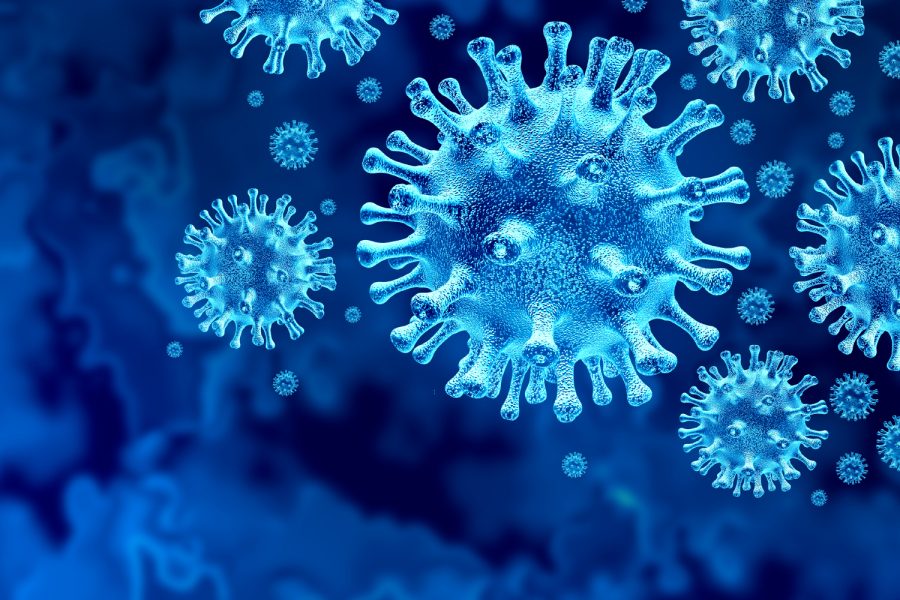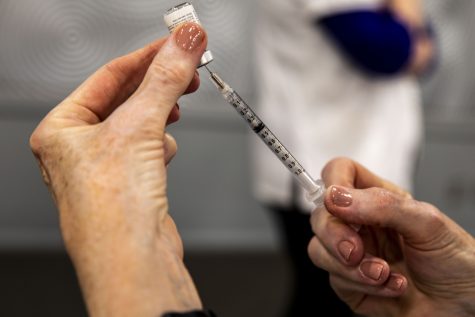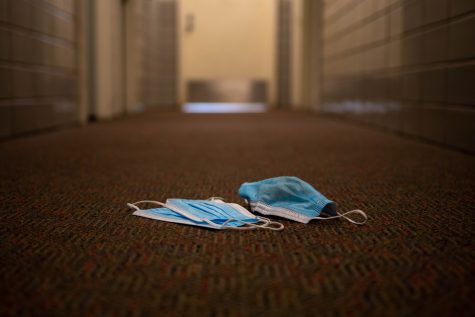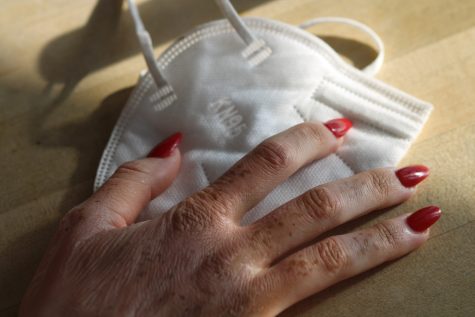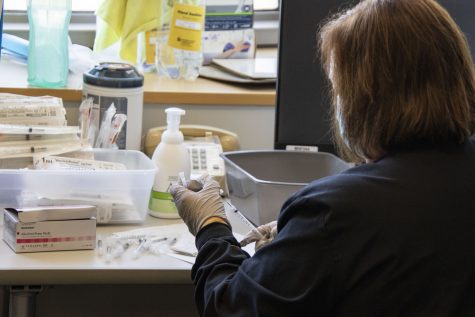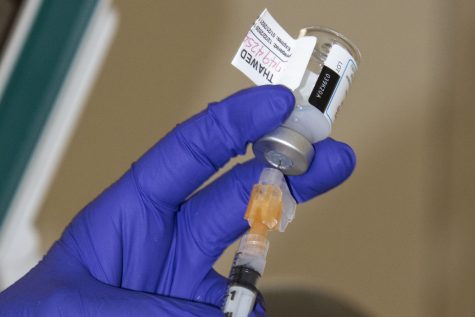Low COVID-19 case and hospitalization rates coincide with end of Iowa’s disaster proclamation
Iowa’s proclamation of a COVID-19 disaster emergency ends Tuesday before midnight. At the same time, cases of the virus in the state are declining. The end of the proclamation means the end of two state COVID-tracking websites and all reporting on negative tests.
February 15, 2022
As rates of COVID-19-related hospitalizations and cases decrease throughout the state, Iowa’s coronavirus disaster proclamation is set to expire Feb. 15 at 11:59 pm. Johnson County Health officials said they will continue to provide tests and information to the community but won’t have as much data to report under the new rules.
Signed by Iowa Gov. Kim Reynolds on March 17, 2020, the proclamation initiated the allocation of state resources against COVID-19 outbreaks and the suspension of state laws that would have hindered hospitals and public health agencies from responding to the pandemic effectively.
The proclamation also gave Reynolds license to close businesses, cancel large gatherings, and limit nonessential surgeries, all of which she did at the start of the pandemic.
In a statement on Feb. 3, Kelly Garcia, interim director of the Iowa Department of Public Health, said once the emergency proclamation expires on Feb. 16 that the state will also terminate two COVID-19-centered state-run websites, vaccinate.iowa.gov and coronavirus.iowa.gov.
The sites allowed users to find COVID-19 vaccine appointments and to view the state’s accumulated COVID-19 data on hospitalizations, new cases, vaccination statuses, and deaths.
Sam Jarvis, community health manager at Johnson County Public Health, expressed concern over deletion of these websites.
“Overall, there is concern among many of us in public health that this is too soon to discontinue those two main areas for information,” Jarvis said. “So really now a burden is placed on local public health and other committee members to be able to continue to provide that information to their patients and clients who need to know that.”
In addition to taking down the websites, the state will no longer require negative COVID-19 test results, which will preclude public health departments calculating seven-day positivity rates per their counties, said Danielle Petit-Majewski, director of the Johnson County Department of Public Health.
Jarvis said there is some concern as to how COVID-19 risks will be communicated to the public with the loss of positivity rates and reporting to the state.
“The positivity rate was one of those metrics that folks really relied on and looked at, but that will change going forward,” Jarvis said.
The end of the emergency declaration will also lift the requirement that hospitals and nursing homes report their case counts to the state, though they will still report their cases to federal agencies, Petit-Majewski said.
From Wednesday on, hospitalization and nursing-home outbreak data for the state can only be found on federal websites, while the state websites will still report weekly on positive tests, deaths, and cases per county, Garcia said on Feb. 3.
“We cannot continue to suspend duly enacted laws and treat COVID-19 as a public health emergency indefinitely,” Reynolds said in a Feb. 3 statement. “After two years, it’s no longer feasible or necessary. The flu and other infectious illnesses are part of our everyday lives, and coronavirus can be managed similarly.”
As of Feb. 14, there were 36 patients with COVID-19 at University of Iowa Health Care compared to 48 on Feb. 13, according to UIHC’s website.
The seven day average number of cases in Johnson County was 91 as of Feb. 8, compared to 425 a month earlier on Jan. 8, according to coronavirus.uiowa.edu.
“We still get some behind-the-scenes information, but we won’t get the full breadth of data that we were before, because they won’t be required to report negative tests, so only positive case counts will be reported,” Petit-Majewski said.
Additionally, she said maximum allotment Supplemental Nutrition Assistance benefits are set to end one month after the governor’s declaration ends. Iowans will see changes to their benefit allotments by April 1, she said.
However, the disenrollment process for Medicaid and Children’s Hospital Insurance Program has not yet begun and will not begin until the federal disaster proclamation ends.
“Johnson County Public Health is still going to be available to take any calls, to answer any questions, to help folks with quarantine, to help folks get access to testing,” Petit-Majewski said. “We’re still going to be distributing test kits here in our office. Just the data we have available to us will be different.”
Jarvis said the Johnson County Public Health Department intends to stay vigilant, saying that the end of the state of emergency will have “minimal impact” on their operations.
“It may not be several hundred cases a day or several thousand within a week, but we’re still seeing high community transmission,” he said. “We’ll still continue to promote being up to date with your COVID-19 vaccination as well as all the other mitigation measures persons, communities, and organizations can put into place to reduce risk of illness, because we know that it’s still very early right after this most recent surge of cases.”



